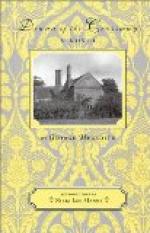(of Satanic construction) who have the art of enslaving
the men unhappy enough to cross their path. The
nature of the art was hinted, with the delicacy of
dainty feet which have to tread in mire to get to
safety. Men, alas! are snared in this way.
Instances too numerous for the good repute of the
swinish sex, were cited, and the question of how Morality
was defensible from their grossness passed without
a tactical reply. There is no defence: Those
women come like the Cholera Morbus—and owing
to similar causes. They will prevail until the
ideas of men regarding women are purified. Nevertheless
the husband who could forgive, even propose to forgive,
was deemed by consent generous, however weak.
Though she might not have been wholly guilty, she
had bitterly offended. And he despatched an emissary
to her?—The theme, one may, in their language,
‘fear,’ was relished as a sugared acid.
It was renewed in the late Autumn of the year, when
Antonia published her new book, entitled
the
young Minister of
state. The signature
of the authoress was now known; and from this resurgence
of her name in public, suddenly a radiation of tongues
from the circle of Lady Wathin declared that the repentant
Mrs. Warwick had gone back to her husband’s
bosom and forgiveness! The rumour spread in spite
of sturdy denials at odd corners, counting the red-hot
proposal of Mr. Sullivan Smith to eat his head and
boots for breakfast if it was proved correct.
It filled a yawn of the Clubs for the afternoon.
Soon this wanton rumour was met and stifled by another
of more morbific density, heavily charged as that
which led the sad Eliza to her pyre.
ANTONIA’s hero was easily identified.
The young Minister of state could
be he only who was now at all her parties, always meeting
her; had been spied walking with her daily in the
park near her house, on his march down to Westminster
during the session; and who positively went to concerts
and sat under fiddlers to be near her. It accounted
moreover for his treatment of Constance Asper.
What effrontery of the authoress, to placard herself
with him in a book! The likeness of the hero
to Percy Dacier once established became striking to
glaringness—a proof of her ability, and
more of her audacity; still more of her intention to
flatter him up to his perdition. By the things
written of him, one would imagine the conversations
going on behind the scenes. She had the wiles
of a Cleopatra, not without some of the Nilene’s
experiences. A youthful Antony Dacier would
be little likely to escape her toils. And so
promising a young man! The sigh, the tear for
weeping over his destruction, almost fell, such vivid
realizing of the prophesy appeared in its pathetic
pronouncement.




